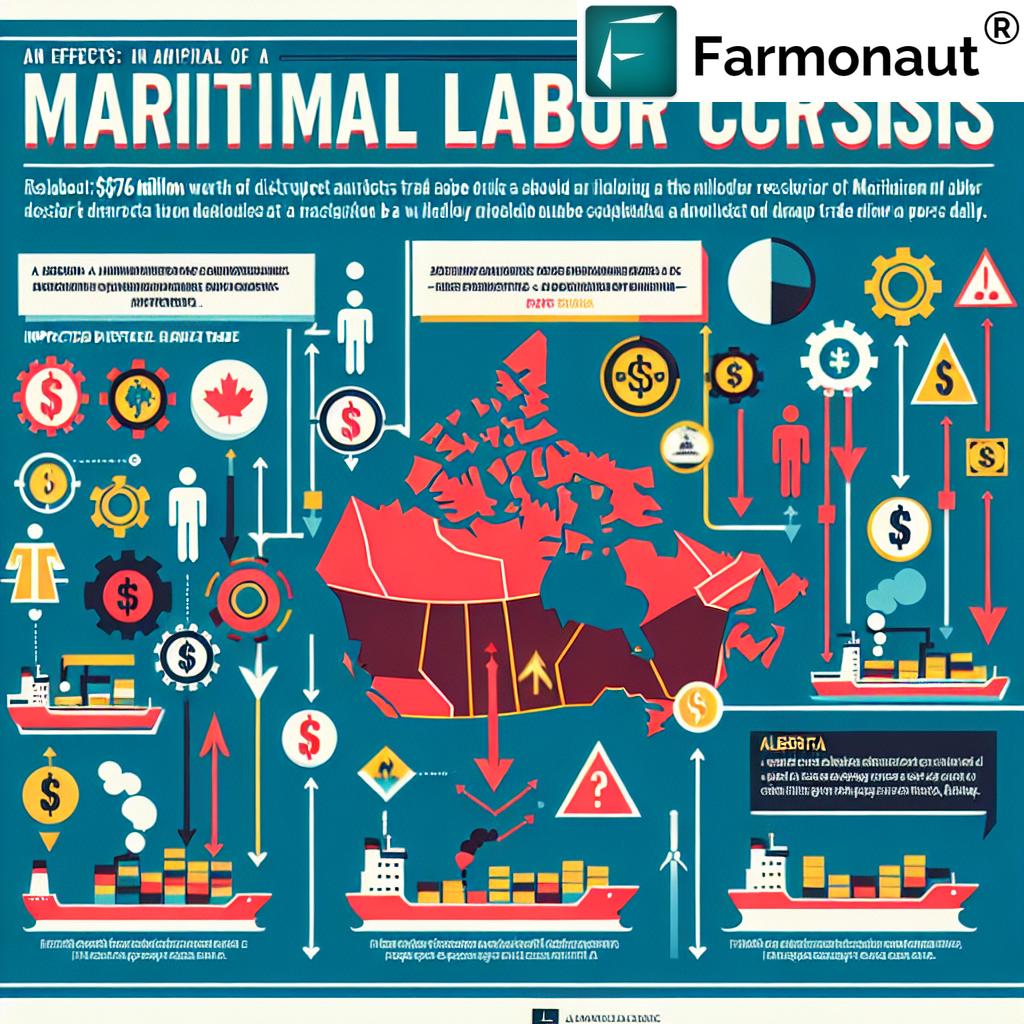Breaking: Canadian Port Lockout Threatens $576M Daily Trade as Dock Foremen Strike Escalates
In a dramatic escalation of the ongoing West Coast port strike, the BC Maritime Employers Association (BCMEA) has initiated a lockout of over 730 dock foremen across Canada’s western ports, including the crucial Port of Vancouver. This Canadian port lockout threatens to disrupt $576 million in daily trade and could have far-reaching consequences for the nation’s economy and supply chains.

The Lockout: A Response to Escalating Labor Tensions
The BC Maritime Employers Association lockout began at 4:30 pm PT on Monday, marking a significant escalation in the ongoing Vancouver port labor dispute. This action comes in response to a 72-hour strike notice issued by the International Longshore and Warehouse Union (ILWU) Local 514, which represents the dock foremen.
The BCMEA stated that the lockout was implemented to “facilitate a safe and orderly wind-down of operations” in light of the unpredictable strike action. This move has effectively brought operations at major West Coast ports to a standstill, raising concerns about the potential for widespread Canadian supply chain disruption.
The Core of the Dispute: Automation and Job Security
At the heart of this Port of Vancouver labor dispute lies the contentious issue of port automation. The ILWU Local 514 has expressed concerns about protecting jobs from increasing automation in port operations. This West Coast port automation dispute reflects a broader trend in the maritime industry, where technological advancements are reshaping traditional labor roles.
- Automation threatens traditional dock worker jobs
- Union seeks job security guarantees
- Employers argue for increased efficiency through technology
The ongoing negotiations between the union and the BCMEA highlight the complex nature of Canadian maritime labor relations in an era of rapid technological change.
Economic Impact: A $576 Million Daily Trade at Risk
The Canadian port lockout impact extends far beyond the immediate vicinity of the affected ports. According to Bridgitte Anderson, CEO and President of the Greater Vancouver Board of Trade, approximately $800 million CAD ($576 million USD) in trade flows through West Coast ports every day.
“This could have disruptions right across our industries, right across our sectors, and in fact right across the whole Canadian economy,” Anderson warned, underlining the potential for widespread economic repercussions.

Alberta’s Concerns: A Landlocked Province’s Perspective
The Alberta trade impact port strike is particularly concerning for the landlocked province. Alberta Premier Danielle Smith and Transportation Minister Devin Dreeshen issued a joint statement highlighting the critical nature of West Coast ports for the province’s economy:
“Alberta is a landlocked province that relies on the safe, dependable movement of goods to and from west coast ports. These ports export about 50 million Canadian dollars ($36 million) worth of Alberta’s key commodities every day including agricultural, energy and manufacturing-related products.”
The statement further emphasized the potential for a prolonged work stoppage to disrupt the movement of these products, backlog other transportation networks such as rail and trucking, and damage the economies of both Alberta and Canada as a whole.
Government Response and Mediation Efforts
As the West Coast port strike escalation continues, the Canadian federal government is closely monitoring the situation. Labour Minister Steven MacKinnon announced via social media that federal mediators are on-site and ready to assist the parties in reaching an agreement.
“It is the responsibility of the parties to reach an agreement. Businesses, workers, and farmers are counting on them to get a deal,” MacKinnon stated, underscoring the urgency of the situation.
Historical Context: Previous Port Disruptions
This current West Coast port disruption is not without precedent. In July 2023, a 13-day strike involving more than 7,400 longshoremen at B.C. ports resulted in significant economic repercussions:
- $10.7 billion CAD ($7.7 billion USD) worth of cargo held up or diverted
- Widespread disruption to the flow of goods into Canada
- Lasting impacts on supply chains and business operations
The memory of this recent disruption adds to the urgency of resolving the current dispute, as stakeholders seek to avoid a repeat of the substantial economic losses experienced last year.
Broader Context: East Coast Port Strikes
Compounding the Canadian supply chain issues, an indefinite strike has been ongoing since Thursday morning at two container terminals at the Port of Montreal on Canada’s East Coast. This action is currently slowing down the processing of 40% of the containers delivered to the port, further straining the nation’s logistics network.
Looking Ahead: Potential Solutions and Long-term Implications
As negotiations continue, several potential solutions are being discussed to address the ongoing Canadian maritime labor relations challenges:
- Binding arbitration, as suggested by Alberta officials
- Enhanced job retraining programs for workers affected by automation
- Phased implementation of new technologies with union consultation
- Government-mediated long-term agreements on port modernization
The resolution of this dispute will likely have far-reaching implications for the future of port operations in Canada and could set important precedents for how the industry navigates the challenges of automation and technological advancement.
Conclusion: A Critical Juncture for Canadian Trade
The ongoing Canadian port lockout represents a critical juncture for the nation’s trade infrastructure and economy. With $576 million in daily trade at stake, the pressure is mounting on all parties to find a swift and equitable resolution to the dispute.
As negotiations continue, the eyes of the nation remain fixed on the West Coast ports, with businesses, workers, and consumers alike hoping for a speedy end to this disruptive chapter in Canadian maritime labor relations.
Stay tuned for updates on this developing story as we continue to monitor the Vancouver port labor dispute and its impacts on Canadian trade and supply chains.
For more information on agricultural and technological innovations, visit Farmonaut, your trusted source for satellite-based farming solutions.
For developers interested in integrating advanced agricultural data into their applications, check out the Farmonaut API and the comprehensive API Developer Docs.
















